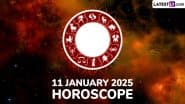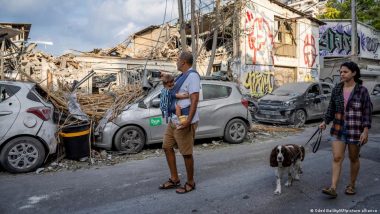Israeli novelists Yishai Sarid, Lizzie Doron and Assaf Gavron are angered and heart-broken by the unprecedented attacks by terrorist group Hamas. Do they still see hope for peace?"This is a terrible time in Israel. Nothing like this has ever happened before. It's really very hard emotionally for all of us," Israeli author Yishai Sarid told DW, describing the deadly attacks and kidnappings of children, elderly people and civilians committed by the terrorist organisation Hamas "as crimes against humanity."
Also Read | India News | Eye on 2024, BJP to Launch Minority Outreach Programme ‘Alpsankhyak Sneh Samvad’.
"It's unacceptable in any sense, you know."
In his seven novels, Sarid has often dealt with the trauma of conflict.
"Victorious," one of his recent books, which was translated into English in 2022 after the international success of "The Memory Monster," is a deep dive into the psyche of Israeli soldiers, and thus into Israeli society, since practically everyone has to do military service in the country.
"The threat of war, the use of violence, the fear: It's a central part of our psychology, of our national and personal soul," says the author. "It's a shadow that hangs over us all the time," he adds. "I'm interested in these themes as a writer, of course."
When Sarid won the Levi Eshkol Literary Award earlier this year, he donated the prize money of 40,000 Israeli shekels (€9,675/$10,200) to a grassroots organization of Palestinian and Israeli families who have lost family members due to the conflict. Such organizations can serve as a symbol of how people are trying to work towards reconciliation. "But unfortunately, it's a small island in a sea of hostilities and violence and war," he adds.
The novelist, who is also a lawyer, finds the current outbreak of violence particularly "heartbreaking," because it basically "kills any hope" of finding a solution to the conflict — especially considering that he is among the minority of Israelis who would accept major compromises in order to live in peace with the Palestinians, including returning to the pre-1967 borders in a two-state solution.
"But for that to happen, you need to have some trust. Trust in the other side," he explains. He still believes that "the solution is not in violence," but, he adds, "right now we have to defend ourselves."
He deplores Prime Minister Benjamin Netanyahu's strategy of strengthening Hamas by enabling Qatar to transfer millions of dollars to the armed group, thereby weakening the Palestinian Authority, a political body with more moderate views. "So politically, strategically, what we are seeing now is the huge failure of Netanyahu in this government and this strategy, not just militarily, but also as a matter of policy," explains Sarid.
Lizzie Doron: More humanity needed
"As a child I grew up in Israel and it was a promise that this is a safe place for Jewish people," points out Israeli author Lizzie Doron. "We've lost our country in a way."
Doron has openly advocated for peaceful understanding between Israelis and Palestinians in her works, which has made her unpopular in her home country — especially after her focus evolved from dealing with the trauma of the Holocaust to interviewing former Palestinian terrorists, to try to better understand their hatred for Israel, as the basis for her novel "Sweet Occupation" (2017).
Still today, amid the attacks, the author believes Israel made the mistake of not being open enough towards its Palestinian neighbors.
Doron feels that for many years, Israel tried to overcome problems and find solutions. "But in recent years, we seem to have gotten off the track," she says, denouncing the Israeli government, along with right-wing and ultra-Orthodox lobbies, for gaining political power in the country's politics and taking over the agenda. They have "brought us to a moment where we have even lost the strength of the military. This is heartbreaking," Doron says.
She also denounces the biblical concept of the "chosen people" that she sees at the core of the Jewish identity. "We have to stop talking about being 'special' due to race or religion. We have a tradition, we have a history, but we have to look at the others, we have to build up empathy towards those who are weaker," she asserts.
While the writer condemns Hamas and their crimes, and stresses that she grieves for everyone who died, she still feels that "we need to do our soul-searching in spite of the catastrophe."
"I don't want to be like Hamas, or like the Nazis or the cruel people who fight against Ukraine," she said. She wants dialogue with the Palestinians, to allow all sides to share "their vision as a human being." "We have to find people who will communicate, otherwise we are doomed to fight forever."
Assaf Gavron: Still hoping for peace
Novelist Assaf Gavron was in London when Hamas launched its multi-front attacks, but he is returning to Tel Aviv on Friday. "This is where I belong. I have my life there and my daughters go to school there," says the author of several novels, including award-winning "The Hilltop" (2013), which is set in an Israeli Jewish settlement in the West Bank.
Gavron also criticizes the government's policies: "They were concentrating on personal issues in the judicial reform, made of laws meant to help Netanyahu escape his fate in his trial. They were concentrated on moving budgets from important issues to the hands of the ultra-religious and the settlers," he says. The judicial reforms and the protests against them made the army weaker, he adds, and "Hamas was well aware of this."
"Netanyahu and his government disregarded the Palestinians; they have been crushing them, and it's been worse than ever. They've been promoting settlements more than ever," says Gavron. They thought they could thereby contain the Palestinian problem, he adds, but "this concept collapsed."
Gavron nevertheless remains hopeful that even if Israel remains traumatized for a long time, the "enormous magnitude" of the current events might create change. "Unusual, unprecedented violent events can lead to realization that there is a need to solve problems in other ways," he says.
"Of course, the automatic reaction is war and revenge and killing, but after it settles, I hope that enough people will realize that the cycle of revenge and violence is not leading anywhere. We cannot erase Gaza or the Palestinians."
"If I don't hope for something like this, I don't know what's the point of staying in Israel," the novelist says. "History is surprising. Look at Berlin or South Africa."
Edited by: Tanya Ott
(The above story first appeared on LatestLY on Oct 10, 2023 04:20 PM IST. For more news and updates on politics, world, sports, entertainment and lifestyle, log on to our website latestly.com).













 Quickly
Quickly




















